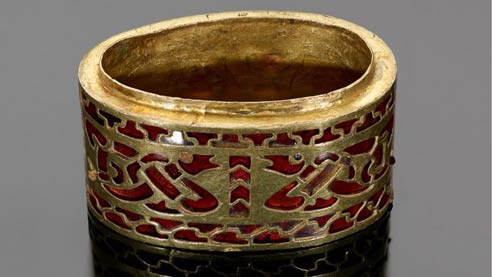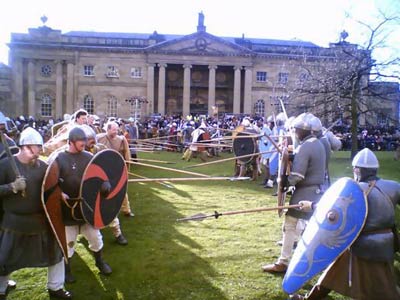

The Mercian Empire
In 7th Century England, political power was in a state of continual flux. By 626, Edwin of Northumbria was recognized a overlord by all the kings in England with the exception of Eadbald of Kent; in 633 he was defeated and killed by Cadwallon of Gwynedd (allied with Penda of Mercia) at the Battle of Hatfield Chase (Meicen).
King Penda took advantage of his alliance with Cadwallon to expand the power of Mercia in central England. In 642, Oswald King of Northumbria attacked Mercia, but was killed. In the next ten years, Penda asserted supremacy over Wessex and attacked East Anglia. He was finally defeated in 655 at the Battle of Winwaed by Northumbria's new king, Oswiu (Oswy).
Northumbrian ascendancy did not last long. King Penda's sons soon began to reestablish the power of Mercia. Mercian power increased under Wulfhere (659-75), but Wessex preserved its independence. Caedwalla, King of Wessex from 685 to 688, and his son Ine (688-726) successfully attacked Kent and Sussex. Wessex also made progress westwards against the British territory of Dunmonia (Devon/ Cornwall); Devon was captured in 682, but Wessex's expansion was interrupted by a significant defeat in 722. Under constant pressure from the Anglo-Saxons, many Britons emigrated to Armorica (Brittany).
Anglo-Saxon society revolved around warfare. Freemen were automatically warriors and were expected to fight from early adolescence. Teenage boys were often taken into a chieftain's household to be trained as warriors. Anglo-Saxon warriors were equipped with javelins and throwing axes as well as swords and shields. A "scramasax" - a single-bladed dagger - was used for close-quarter fighting.
Christianity, like Roman culture, largely disappeared during the Anglo-Saxon invasions. Early Anglo-Saxon place names indicate only pagan worship - Tiw in Great Tew; Wodin in Wednesbury; Thursley was Thor's glade and Frigedene was Frigg's meadow. In the course of the 7th Century, virtually all of England was converted to Christianity by Christian missionaries from Rome and Ireland. The Roman missionaries were sent by Pope Gregory the Great who had earlier encountered English pagans in Rome.
Mercia's power grew during the 700's in large part because it was ruled by two strong-willed and long-lived kings - Ethelbald (716-57) and Offa (757-96). Ethelbald and Offa both insisted that the Church contribute towards public works such as road and bridge building, and help finance military ventures. Ethelbald established supremacy over much of Wessex and Essex, and styled himself "rex Britanniae" (king of the British) in a charter of 736. Ethelbald - possibly because of his tyrannical tendencies - was murdered in 757 by one of his bodyguard. Offa had to fight to establish his claim to the throne, and for some years, Mercia saw considerable disorder. A final achievement of Offa was the building of defensive earthworks and ditches along the border with Wales -- total length of earthwork over 120 miles.

Statffordshire Hoard
The Staffordshire Hoard is the largest hoard of Anglo-Saxon gold and silver metalwork yet found. Discovered in a field near the village of Hammerwich, near Lichfield, in Staffordshire, England on 5 July 2009, it consists of over 3,500 items[1] that are nearly all martial in character, and contains no objects specific to female uses. The artefacts have tentatively been dated to the 7th or 8th centuries, placing the origin of the items in the time of the Kingdom of Mercia.
